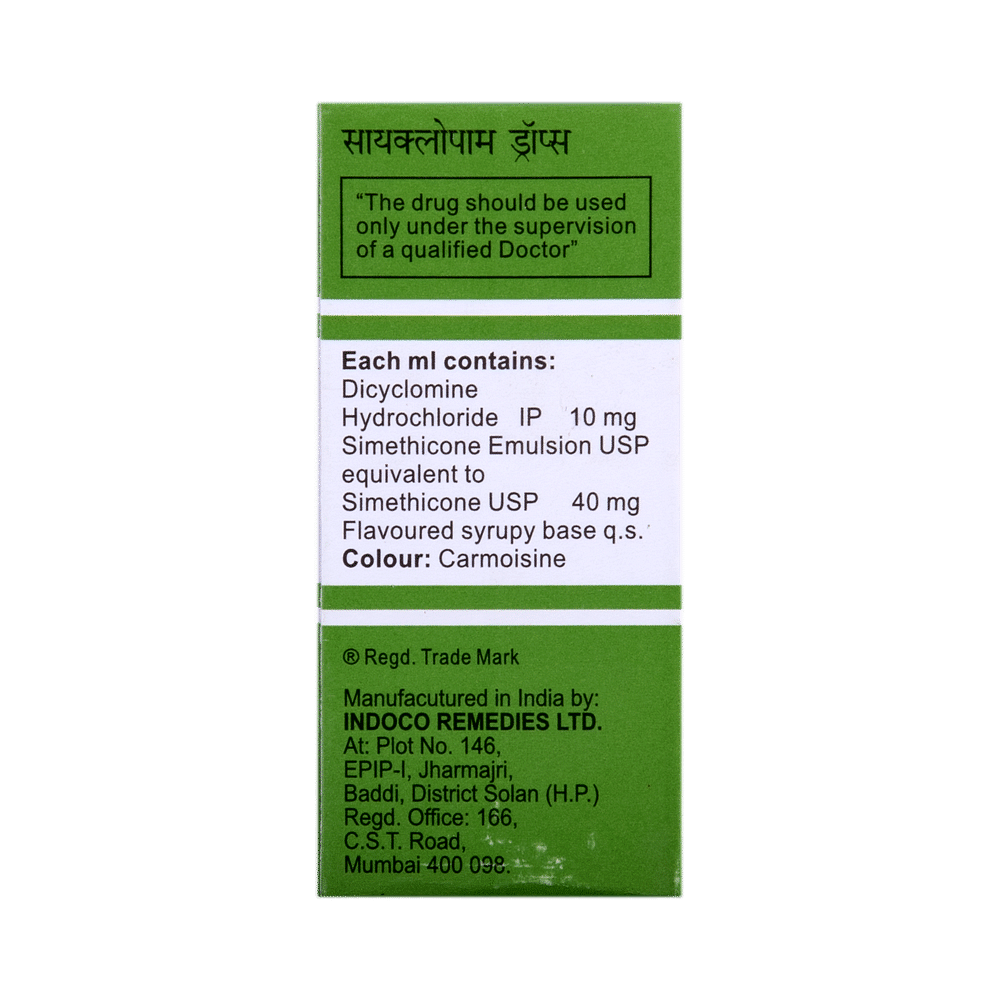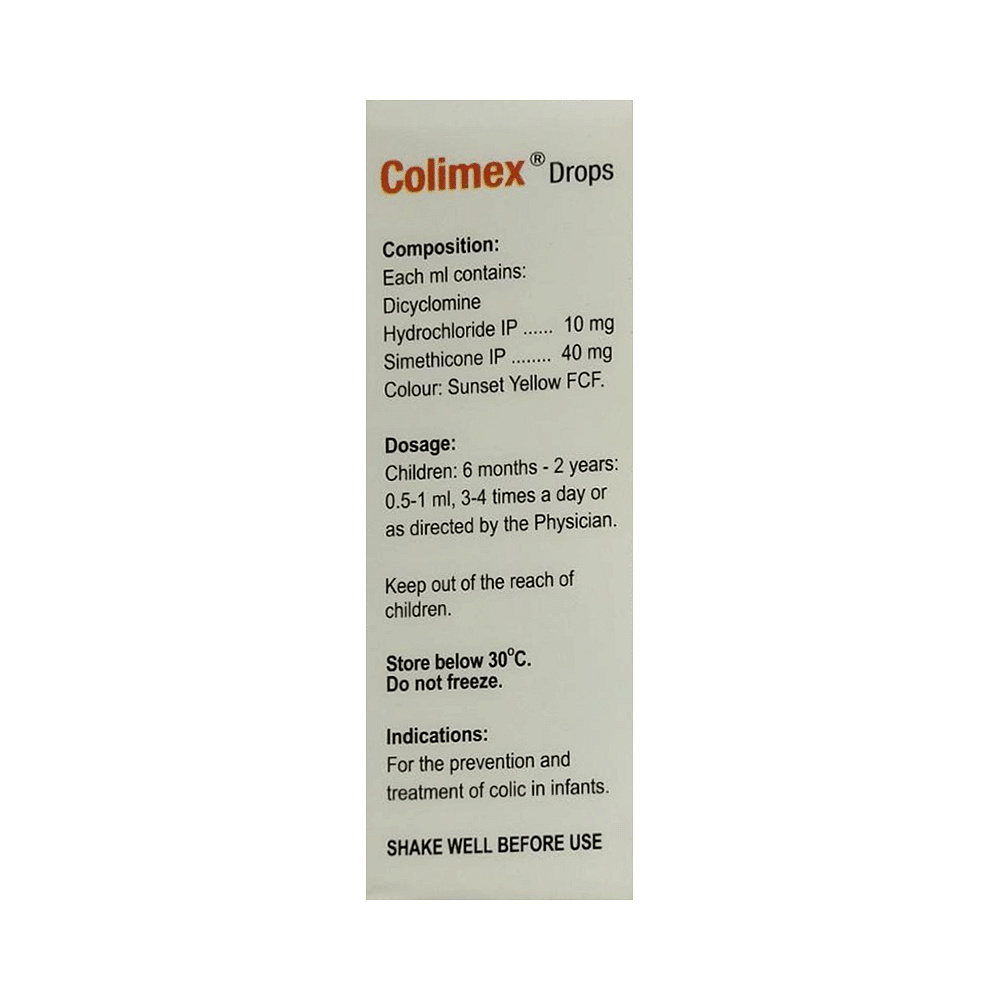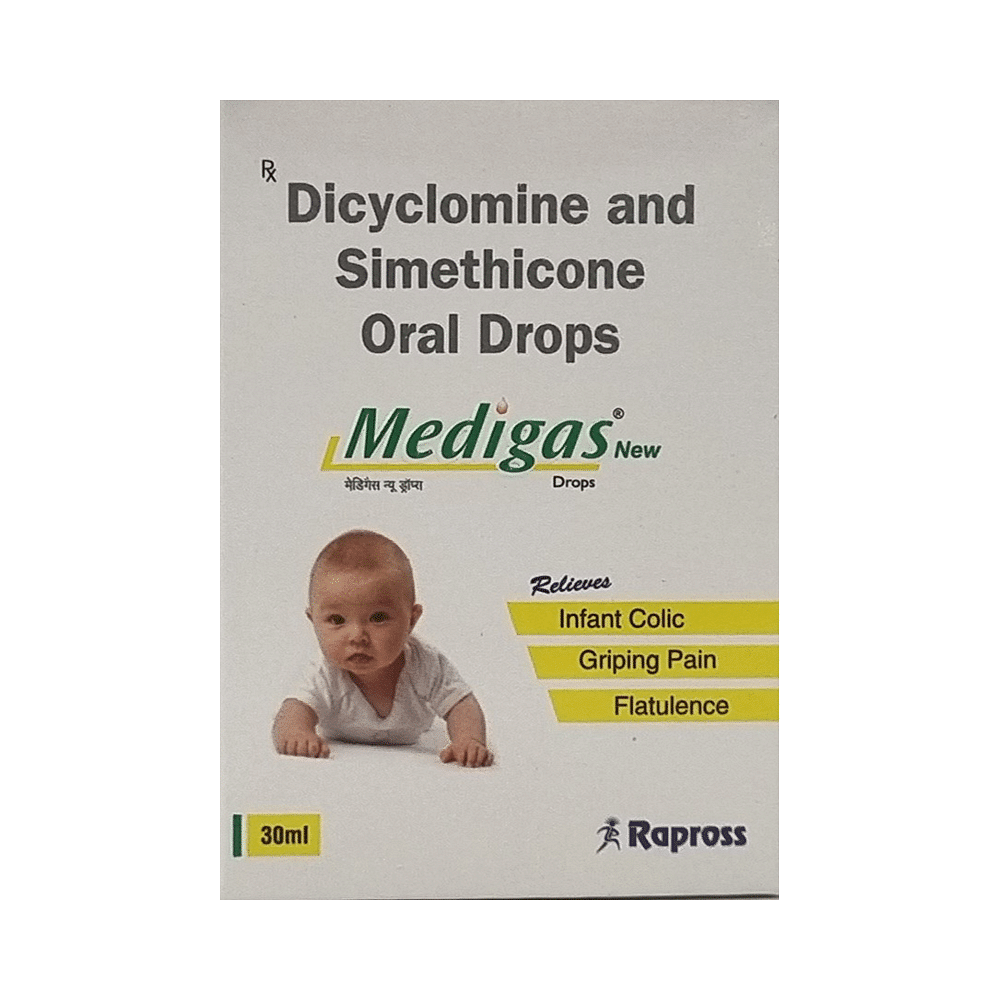
Intispas Oral Drops
Manufacturer
In Med Therapeutics
Salt Composition
Dicyclomine (10mg) + Simethicone (40mg)
Key Information
Short Description
Intispas Oral Drops is commonly given to treat stomach pain, bloating, and abdominal cramps, and pain associated with excessive acidity, gas, infections, and gastrointestinal tract diseases.
Dosage Form
Oral Drops
Introduction
Intispas Oral Drops is a mixture of two active medicines, Dicyclomine, an antispasmodic agent, and Simethicone, an antifoaming medicine. It is used to treat stomach pain, bloating, and abdominal cramps, and pain associated with excessive acidity, gas, infections, and gastrointestinal tract diseases. It relaxes the muscles of the gut and absorbs the extra gas. The medicine is usually given to children and is available in the form of oral drops. It is important to follow the doctor's instructions and not to exceed the recommended dose.
Directions for Use
Take this medicine in the dose and duration as advised by your doctor. Check the label for directions before use. Measure it with a marked dropper and take it as directed. Intispas Oral Drops is to be taken with food.
Safety Information
Side Effects
Nausea Vomiting Constipation Burping Vision problem Loss of appetite Drowsiness
Alcohol Warning
Intispas Oral Drops may cause excessive drowsiness with alcohol.
Breastfeeding Warning
Intispas Oral Drops is probably unsafe to use during breastfeeding. Limited human data suggests that the drug may pass into the breastmilk and harm the baby.
Pregnancy Warning
Intispas Oral Drops is generally considered safe to use during pregnancy. Animal studies have shown low or no adverse effects to the developing baby; however, there are limited human studies.
How it works
Intispas Oral Drops is a mixture of two active medicines, Dicyclomine, an antispasmodic agent, and Simethicone, an antifoaming medicine. Dicyclomine works by relaxing the muscles in your stomach and gut (intestine). It stops sudden muscle contractions (spasms) thereby relieving abdominal cramps and pain. Whereas Simethicone disintegrates gas bubbles and allows easy passage of gas.
Quick Tips
Inform your doctor if you experience severe or long-lasting pain in your stomach. Give your child a diet that is rich in fiber and low in fermentable sugars. Avoid giving gas-producing foods to your child such as beans, onions, carrots, raisins, and bananas. Encourage your child to exercise daily as it has potential benefits in constipation and in improving overall wellbeing. In children less than 2 months of age, do not give Intispas Oral Drops without ruling out the reasons that might be making your child cry. Give Intispas Oral Drops only if your child shows actual signs of abdominal discomfort or pain after consulting your child's doctor. Children may experience abdominal pain due to migraines. The other associated symptoms can be a headache, nausea, anorexia, vomiting, and pallor. Since Intispas Oral Drops is strictly for abdominal pain, rule out such types of pain before giving this medicine.
Related Medicines

Cyclopam Drop

Colimex Drops

Medigas New Oral Drops

Clomin Drops

Cyclosun Drop

Cyclorest Oral Drops

Dromak Oral Drops

Spasmnic Oral Drops

Delpoclam Oral Drops

Infagut Oral Drops
Frequently asked questions
My child is experiencing abdominal pain accompanied by nausea, vomiting, and sensitivity to light. Is Intispas Oral Drops suitable in such a case?
The symptoms described may suggest abdominal migraine, characterized by recurring episodes of dull to moderate to severe abdominal pain lasting at least six months. This pain typically occurs centrally or is poorly localized. Abdominal pain often occurs alongside other features such as anorexia, nausea, vomiting, headache, photophobia, and pallor. It is crucial to rule out this type of pain before administering Intispas Oral Drops.
What types of tests should be conducted on my child if they are experiencing abdominal pain?
A routine examination may involve an abdominal ultrasound. For more severe cases, endoscopy and esophageal pH monitoring might also be considered.
In which medical conditions should Intispas Oral Drops not be used?
Avoid administering Intispas Oral Drops in conditions affecting the digestive tract, including obstructive and inflammatory diseases. Examples include heartburn, unstable cardiovascular disease, obstructive uropathy, glaucoma, muscle weakness disorder, liver impairment, hyperthyroidism, neuropathy, and kidney impairment.
Can other medications be taken simultaneously with Intispas Oral Drops?
Intispas Oral Drops may interact with other medicines or substances. Consult your doctor about any other medications your child is taking before starting Intispas Oral Drops. It's essential to seek guidance from a healthcare professional for safe medication combinations.
How should Intispas Oral Drops be stored?
Intispas Oral Drops should be stored at room temperature, away from direct heat and sunlight. Keep all medicines inaccessible to children to prevent accidental ingestion.


